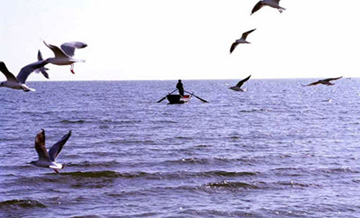| Tools: Save | Print | E-mail | Most Read |
| Projects Designed to Curb Salinization of Bosten Lake |
| Adjust font size: |
To prevent Bosten Lake – also known as Bagrax Lake – which is the country's largest inland stretch of freshwater from salinizing, northwest China's Xinjiang Uygur Autonomous Region will begin four environmental protection projects this year, according to a Xinhua News Agency report on July 2. Officials with the region's development and reform commission revealed that the projects involve industrial and urban consumer sewage treatment, comprehensive retrieval of farmland drainage and allowing cultivated land to revert to its natural state. The sewage treatment project, which is funded partly with the Austrian government loans, has already been implemented this year to help the four counties around the lake build four sewage plants to alleviate the problem of excessive discharges of waste water and recover the damaged ecological environment. The total investment of the project stands at 84.65 million yuan (US$10.4 million) of which 47.03 million yuan (4.95 million euros) came from Austria. The remaining funding is being supplied by local governments. The signing ceremony for the project was held on February 27, 2006. Before this, local governments had adopted a number of effective measures to improve the situation. These included allowing cultivated land to revert to grasslands, cultivating reeds, recovering wetlands and bringing into line those responsible for pollution. Local officials promise that with the implementation of the four projects, activities going on around the lake which cause pollution will be effectively controlled within two years and the problem of excessive discharges of waste water will be resolved in five years. The urban consumer waste water and farmland drainage will be treated and then used in reed cultivation and wetland recovery operations. All construction and land development projects within the lake valley will be strictly managed and supervised. Illegal cultivation of barren land and excessive logging of diversiform-leaved poplars and purple willows would be severely punished, according to the regional development and reform commission. The environmental protection of the Bosten Lake has been listed in the region's key construction plans for 2006. There are also six smaller projects involving the recovery and protection of reed wetlands in the lake area, ecological forest planting, ecological environmental observation and research. The Bosten Lake has an area of 1,001 square kilometers. As China's largest inland freshwater lake formed by melting snow from the Tianshan Mountain, it is also a paradise for rare and endangered birds such as egret, hern, red-billed gull and widgeon. Statistics from local governments show that pollution in the lake has been serious over the past decade with the mineraliztion of water reaching 1.32 grams per liter in 2005 from 1.17 grams per liter in 2000. And the salinization is obvious. Farmland drainage, industrial and household waste water going into the lake are considered to be the three largest polluters. The completion of the four projects will also help to promote the development of local businesses like fishing and tourism.
(China.org.cn by Li Jingrong, July 6, 2006)
|
| Tools: Save | Print | E-mail | Most Read |
 |
| Related Stories |
| Product Directory China Search |
Country Search Hot Buys |

